
Madagascar in Depth Itinerary
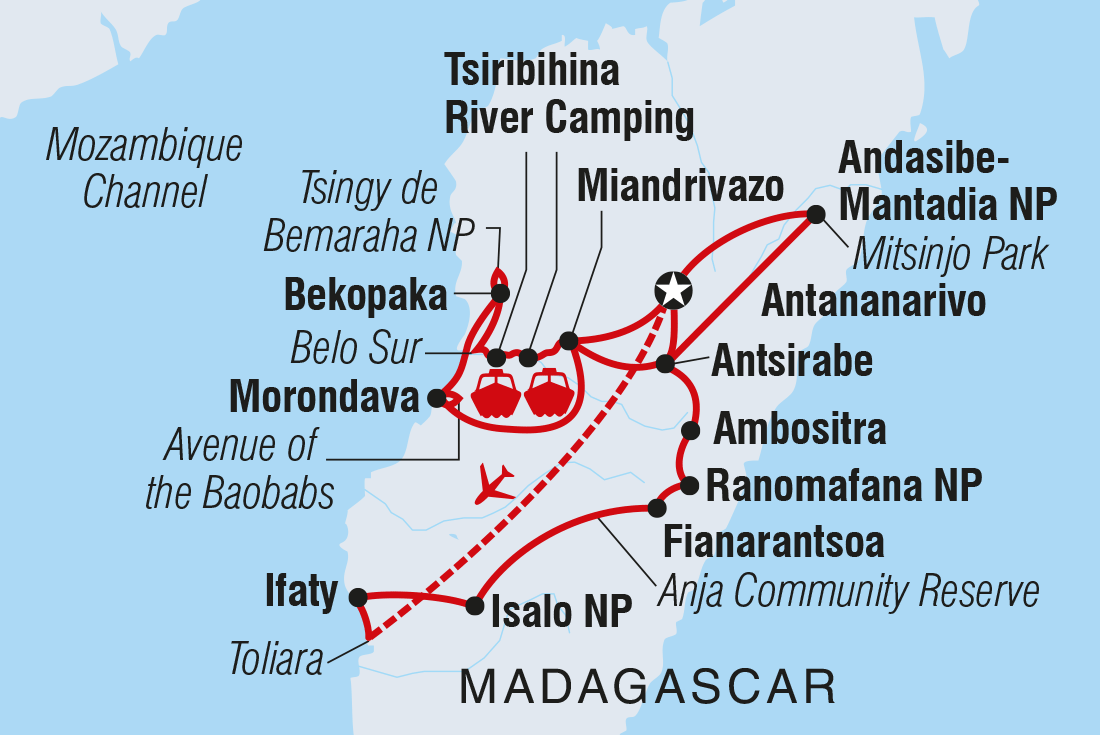


Tonga soa! Bienvenue! Welcome to Antananarivo, Madagascar's crowded but charming capital. Your adventure officially begins with a welcome meeting at 5 pm. If you decide to arrive early, take some time to get acquainted with the city. With cobbled streets, wooden houses and impressive churches, ‘Tana’ has a distinctly romantic air. Perhaps wander the streets of Haute-Ville or visit the permanent Analakely street market. After your welcome meeting this evening, perhaps get to know your new friends over an optional dinner.
Be prepared for a long drive as you begin the journey west this morning. Maybe kick back with a book or get to know your fellow travellers during the drive to Miandrivazo, a small city that will act as the starting point for your adventure down the Tsiribihina River. On arrival, check in to the hotel and listen to a briefing on essential information for your two-day cruise. Head out to pick any extra supplies you may need or desire for the next few days, then get some rest in preparation for tomorrow.
Rise and shine for the 35-kilometre drive (approx 2hrs) to Masiakampy, where you will find a traditional barge waiting to escort you along the Tsiribihina River. These flat bottom boats were once used to transport tobacco, but without that precious cargo they make a comfortable way to cruise along the water and access the remote reaches of western Madagascar. For the next few days, you’ll have the chance to spot wildlife on the banks and in the water, enjoy easy walks to hidden waterfalls and stop off in rural villages. Climb aboard and meet the crew, then settle in and enjoy some lunch as you travel through flat farming plains and enter the dramatic gorges of the Tsiribihina, stopping in the afternoon to trek to a waterfall before returning to a large sandbank to set up camp.
Enjoy a full day gliding along the water today, travelling into the heart of the river and waving to the locals on the banks and barges as you pass. In the absence of roads, nature flourishes along the river in this part of Madagascar – watch out for herds of zebus crossing the river, and flashes of colour as you look for bee-eaters, herons, and egrets in this bird lovers’ paradise. Stop occasionally for a village walk or a short trek for animal spotting before setting up camp at a village along the shore. This evening, light a campfire and enjoy some traditional Malagasy music and dancing with the locals.
Enjoy one last morning along the Tsiribihina river before disembarking the boat and bidding farewell to the crew. Make a quick stop at Belo-sur-Tsiribihina, a small village nestled in the marshes and mangroves of the Delta, to check out the market and grab some lunch before beginning the 5-hour 4x4 off-road drive to Bekopaka. Once we arrive, take the rest of the day to enjoy a swim or a refreshing shower and rest your weary limbs. Tomorrow, you’ll be taking on the Small Tsingy.
Rise early, pick a comfortable outfit and pack some snacks, as today you’ll spend up to five hours trekking through the Small Tsingy, located in Bemaraha National Park. Scramble and navigate through a labyrinth of limestone formations that resemble a forest made of rock. Stop at two lookout points along the way for photo opportunities and a chance to take in the impressive surrounds. In the afternoon, unwind with a float down the Manambolo River on a pirogue (wooden dugout canoe) under the shadow of these towering rock cliffs. Enjoy an easy afternoon cave stroll, taking the sight of stalactites, stalagmites and the eerie tombs of the Vazimba – said to be the earliest inhabitants of Madagascar.
Embrace another early start this morning and prepare for another action-packed trip to the Great Tsingy. Getting up early again might be a struggle, but it’s the best way to beat the heat and more intense crowds. Largely unexplored until the 1990s (the name Tsingy is very roughly translated as ‘place where one cannot walk barefoot’ in Malagasy), the area is now easier to navigate due to a series of bridges, semi-permanent climbing plugs and other equipment. Feel your heart stop as you pass over a sheer drop via a suspended bridge, a truly breathtaking experience that those with vertigo may wish to skip. Animal lovers should keep an eye out for 11 species of lemurs, 100 species of birds and 45 endemic reptiles and amphibians, including the Madagascar iguana and Antsingy leaf chameleon.
There is another long day of travel ahead - including an 8-hour 4x4 adventure on bumpy roads. Grab that book or download a podcast and prepare to keep yourself occupied as you cross the Manambolo River and the Tsiribihina River by ferry, arriving in the laid-back seaside town of Morondava in time for a spectacular sunset in the Avenue of the Baobabs. These cartoonish, towering trees are native to Madagascar, and the variety you’ll see lit from behind this evening are adansonia grandidieri, the tallest of them all. Watch the sky turn pink and yellow and finally cast these trees – many of which are up to 800 years old – in shadow. Spend the night in Morondava and take a well-deserved rest.
Take some time this morning to enjoy free time in Morondava. You may choose to relax on the beach or visit the local markets. This afternoon we will make our way to Miandrivazo.
Depart this morning for Antsirabe, the capital of the Vakinankaratra region. Along the way, enjoy an easy trek in the countryside and discover the beauty of the local lakes, including the emerald-green waters of Tritiva, an extinct crater surrounded by verdant forest. Hike through the lakes district and sit down for a picnic-style lunch. Antsirabe maintains a Malagasy touch, thanks to the contrast of its bustling street markets and French-inspired facades. Located in the highlands, it's a popular spa town thanks to the hot springs and thermal baths, and the colourful rickshaws known as 'pousse-pousse' are a popular form of transport.
Welcome back to bustling Antananarivo. You'll arrive at approximately 2 pm, before the second part of your adventure begins with a welcome meeting at 5 pm, where you'll have the opportunity to meet your new travel companions and, potentially, your new leader. After the meeting, why not head out for an optional dinner with your new group at a local restaurant?
Start your day with an early morning flight to Tulear, where you'll head straight to Reniala Private Park for a memorable breakfast beneath the majestic baobab trees. Afterward, a local guide will lead you on a walk through the Spiny Forest, one of the last remaining areas of primary forest in southern Madagascar. Along the botanical trail, you'll encounter fascinating trees, including the towering baobabs with varieties like the 'dwarf,' 'teapot,' and 'rhinoceros,' some reaching over 13 meters in circumference. Birdwatchers can look forward to spotting rare species such as the Long-tailed Roller and Red-headed Coua among the 65 bird species in the reserve. During your walk, you'll also learn about Madagascar's unique flora, their traditional uses, and the vital importance of preserving this fragile ecosystem. The reserve further contributes to the local community by creating employment opportunities, particularly for women.
Today is yours to enjoy at your leisure. You might choose to relax by the pool or beach or take a stroll through the hotel’s stunning gardens. Looking for something more active? Why not visit the Recycling Museum in Tulear, an institution dedicated to environmental protection and raising awareness among locals and visitors alike.
Depart from Ifaty in the morning and make your way to Tulear. Here, your leader will show you the sites and sounds of Tulear with its charming buildings, wide lanes, and vibrant rickshaws (pousse-pousse) zipping through the streets. Locals prefer rickshaws over cars, keeping the air refreshingly clean for a city of its size. Explore tree-lined avenues with tamarind and flamboyant trees, and enjoy the lively atmosphere created by its diverse community. Afterward, pick up some food for lunch and continue to Isalo National Park.
After breakfast today, you’ll make tracks to Isalo National Park for a full day of exploration with your leader. Isalo is known for its variety of landscapes, from rainforests and rolling plains teeming with life to strange geological formations and deep-cut canyons. The park is home to over 80 species of birds, 30 species of reptiles and 14 species of mammals, including three lemur species – ring-tailed, red-fronted and the dancing sifakas lemur!
Today, you’ll say goodbye to Isalo National Park and hit the road for Fianarantsoa – a colourful town known for its heritage site. Along the way, you’ll stop at the Anja Community Reserve. The forest in Anja was designated a protected area by the Government of Madagascar in 1999. The reserve extends over 30 hectares and is enriched with all kinds of flora and fauna, most notable for its dense population of semi-tame ring-tailed lemurs. Anja has become a vital example of how community management of natural resources can effectively protect the area and benefit the community. Based on their individual skill sets, some locals work as guides and spotters or they perform administrative tasks for the reserve. The villagers will be your guides as you explore the reserve this afternoon. Tonight, you’ll stay at Ecole Hoteliere La Riziere at the foot of Fianarantsoa’s Old Town. This hotel sits above the town on a hill, providing views of the community and the rice fields below. It also doubles as a school, providing basic hospitality training to young people in the community, 65% of whom are female. Their education includes learning the challenges of sustainable development and the income from the establishment finances this training, making it possible to reduce the tuition fees for disadvantaged students.
Today you’ll explore the long, paved roads, twisting alleys and old houses of Fianarantsoa. Wander past tiled roofs and flower-studded balconies, then visit a typical Malagasy village for an insight into how most of the island's population live. Explore the surrounding countryside, dotted with rice paddies and vineyards that produce Fianarantsoa's famous wine. You'll get a chance to sample the local cuisine with a lunch stop in the village. In the afternoon, travel to Ranomafana National Park. This area is a haven for small mammals, birds, reptiles and insects, as well as palms, bamboo, orchids and carnivorous plants. This park is also home to 13 species of lemur, including the famous golden bamboo lemur, which was first reported in the area in 1985. Its presence is one of the main reasons why the government decided to protect this forest. With your free time later this afternoon, maybe visit the thermal springs the town is named after – located across the Namorona River. The outdoor swimming pool fed by the springs is a popular spot to take a dip.
Today, you’ll explore Ranomafana National Park on a four-hour guided walk. Keep your eyes peeled for lemurs, striped civets, mongooses, goshawks, geckos, frogs, and butterflies. You may even spot an incredible net-casting spider or the world's smallest chameleon.
Today, you’ll explore Ranomafana National Park on a 4-hour guided walk. Keep your eyes peeled for lemurs, striped civets, mongooses, goshawks, geckos, frogs and butterflies. You may even spot the incredible net-casting spider or the world's smallest chameleon! Then, transfer to ValBio Research Centre, which sits just outside the beautifully lush national park – under the direction of renowned primatologist Patricia C. Wright, the centre works to protect Madagascar’s unique and biologically diverse ecosystems through conservation projects that directly benefit local communities. You’ll get a chance to tour the centre with a researcher and sit down for an informal session to learn about the work they do. Have some lunch here, then if you have the energy, maybe head out on another included walk through the national park to spot more wildlife.
Today, you’ll make the journey to Ambositra – home to the third-largest ethnic group in Madagascar, the Betsileo people. Ambositra is known as the arts, crafts and wood carving capital of Madagascar. You’ll stop by the Id’om Art workshop and learn more about marquetry – the practise of cutting and assembling small pieces of coloured wood, using a hand-operated jigsaw. The jigsaw is created from old car tyres’ wire and it can take up to 2 months to make a 1-m-wide artwork. You’ll see how these craftsmen create their amazingly detailed marquetry with sheets of naturally coloured wood and you’ll have the opportunity to browse the impressive artworks on display.
This morning, you'll visit the nearby Sandrandahy association to learn about the process of silk production, which is an important part of Malagasy culture. When a Malagasy is buried, their body is wrapped in a large silk sheet known as a 'lambamena' and after a few years, the family traditionally returns to the tomb to exchange the sheet for a new one. The association supports over 40 women from neighbouring villages – a holistic approach to community development, with traditional silk weaving as its hub. After learning more about this initiative, you’ll drive to Antsirabe, located in the Malagasy highlands. This evening, sit down for a group dinner in the gazebo within the grounds of the guest house.
Today is a long travel day as you make your way to Andasibe. The most visited park in Madagascar, Andasibe National Park is famous for the 11 species of lemur that call this place home. This afternoon, relax at your accommodation and get ready for tomorrow’s adventures.
This morning, you’ll set out to discover all the unique wildlife in Andasibe National Park on a guided walk. Look out for lemurs, endemic birds, frogs and insects. Later, you'll take a night walk through the forest of Analamazaotra Special Reserve. This forest was formed in 1999 by residents of the village of Andasibe in east-central Madagascar. Today, the organisation is composed of more than 50 members from the local community who focus on conservation, research and sustainable development initiatives. In total, the reserve positively impacts more than 400 households in the Andasibe area. Experience the rainforest after dark, where nocturnal mouse lemurs, chameleons, geckos, frogs and fireflies come alive.
After breakfast this morning you’ll head off for your final stop in Antananarivo. When you arrive back in Antananarivo, you’ll take part in a hands-on Madagascan chocolate workshop led by a local chocolate maker. Learn about the ingredients used in chocolate-making, the refinement process and some of the secrets as to why Malagasy chocolate is so unique and delicious. After preparing your own take-home chocolate creations, Malagasy pastries will be served with a selection of local teas, coffees and for the courageous, rhum arranges (flavoured rum). Tonight, why not keep the celebrations going with a final dinner with your group and toast your Madagascar adventure with a local beer or two.
With no activities planned for today, your adventure ends after breakfast and you’re free to leave at any time. If you’d like to extend your time in Antananarivo, just speak to your booking agent ahead of time.

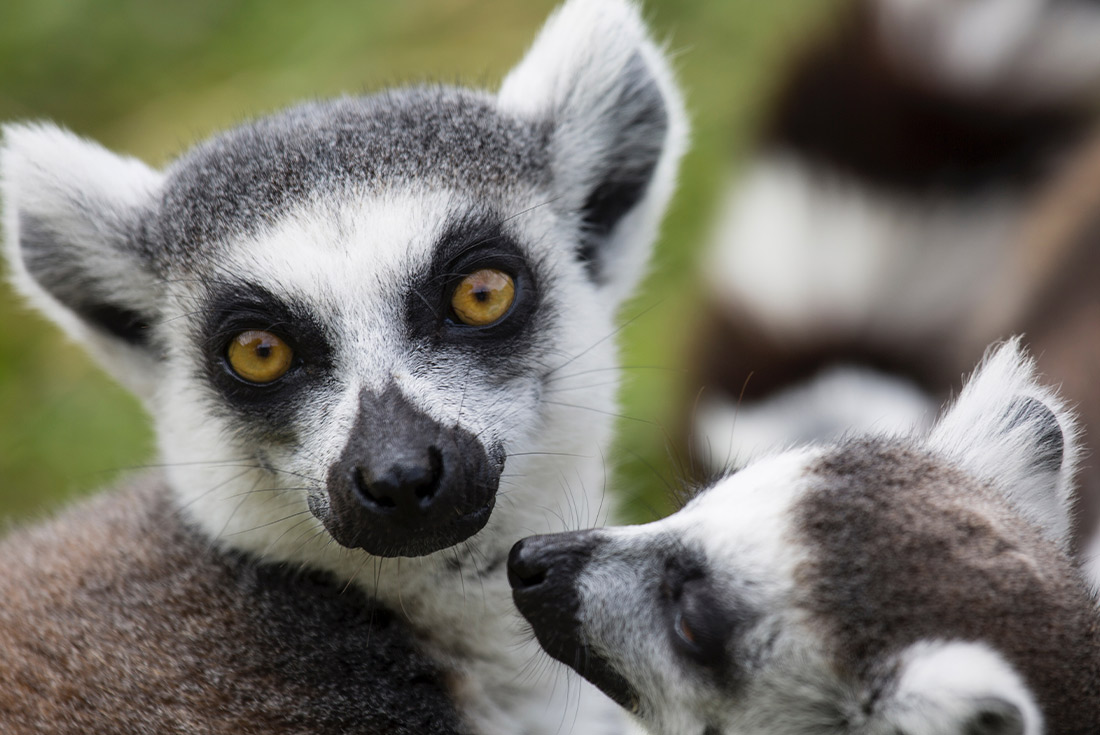
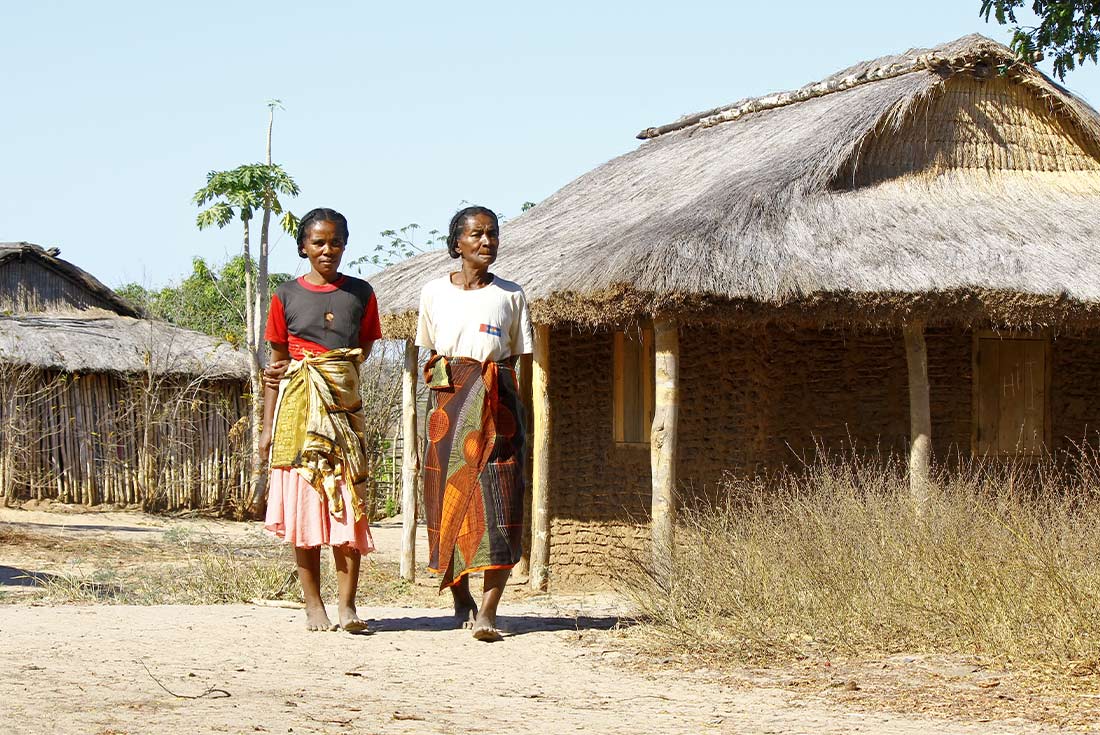
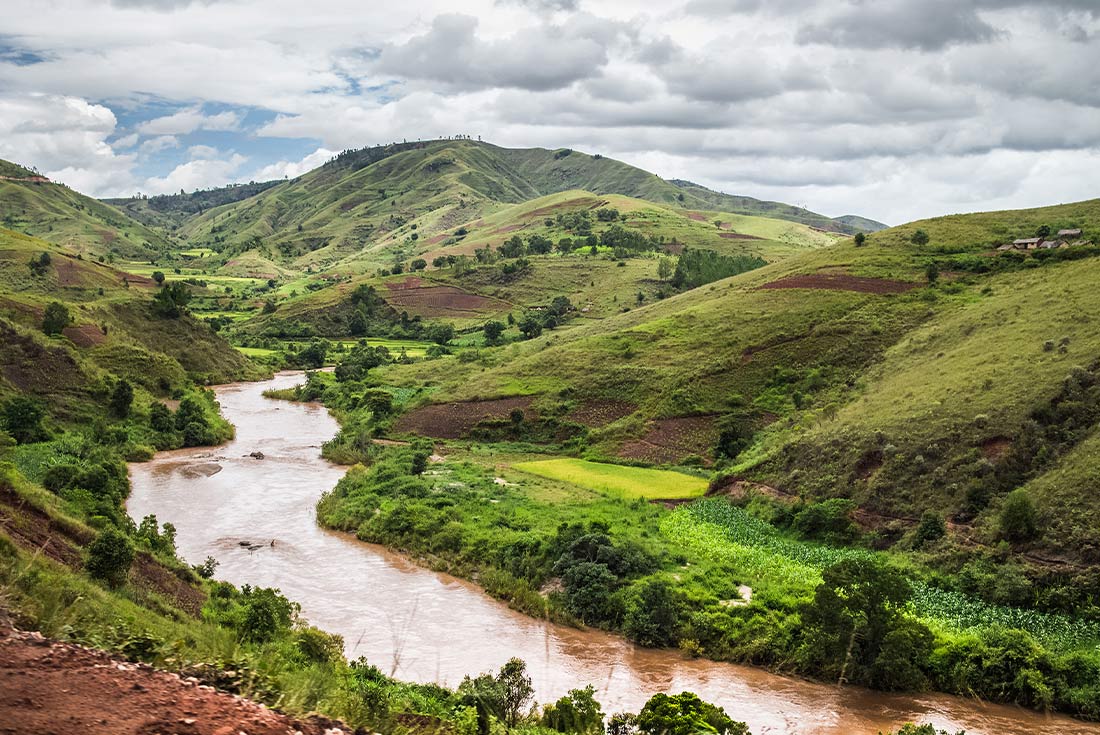
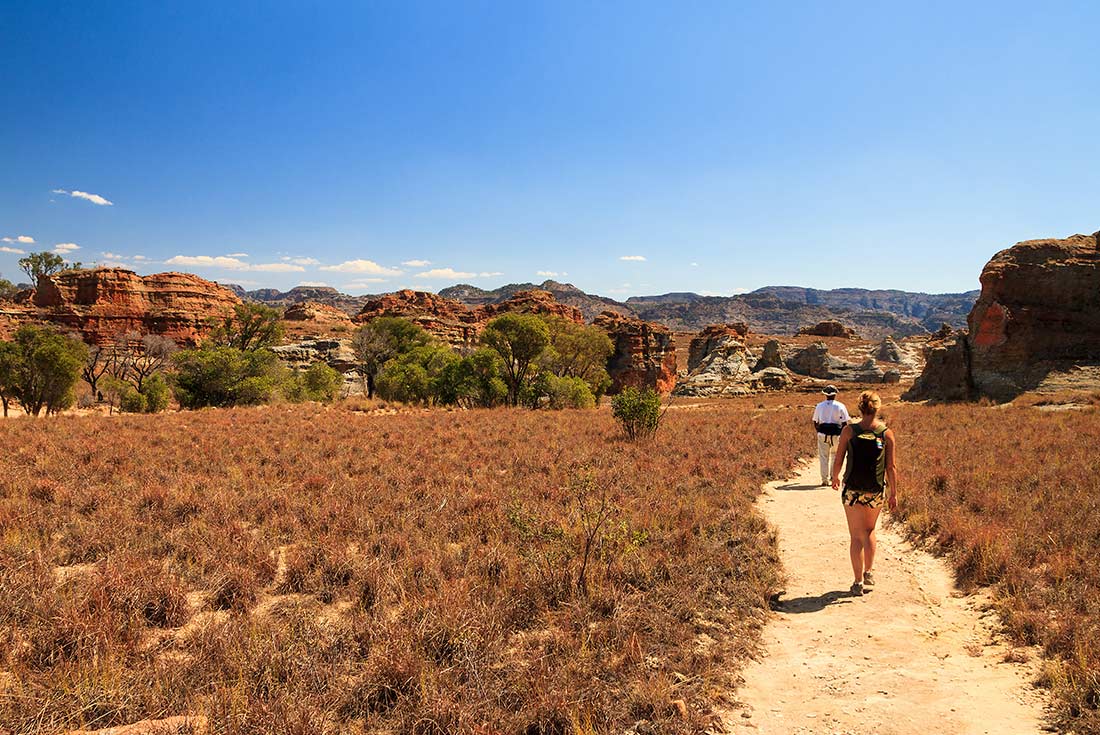
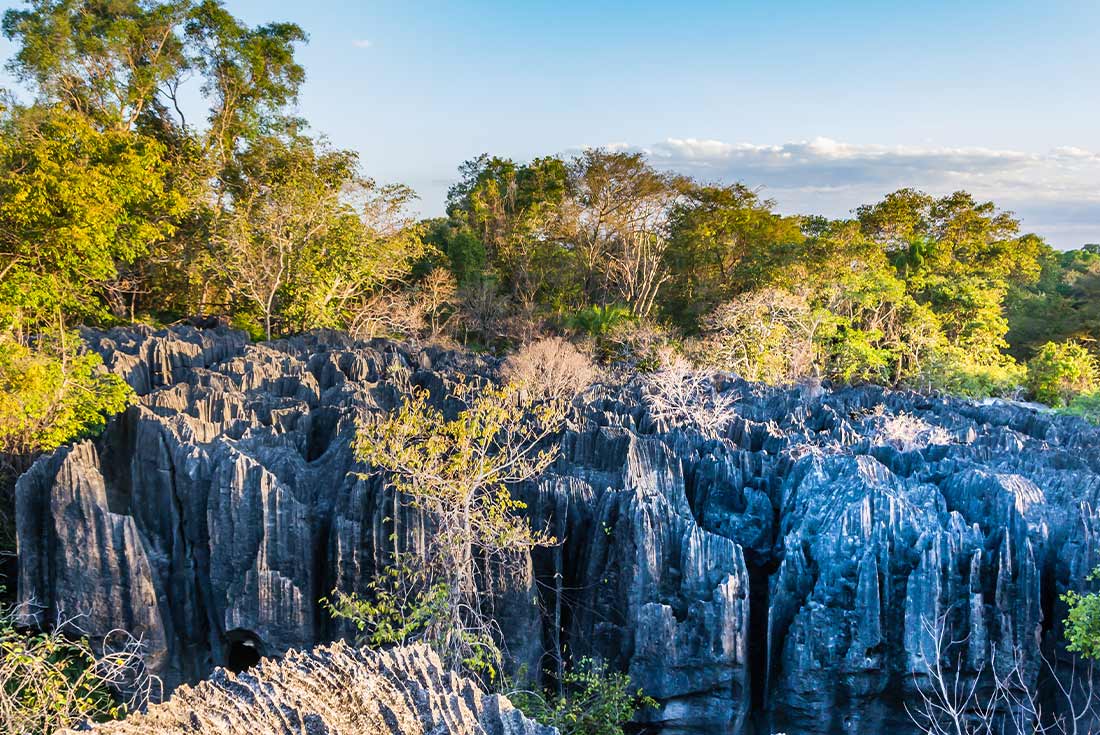
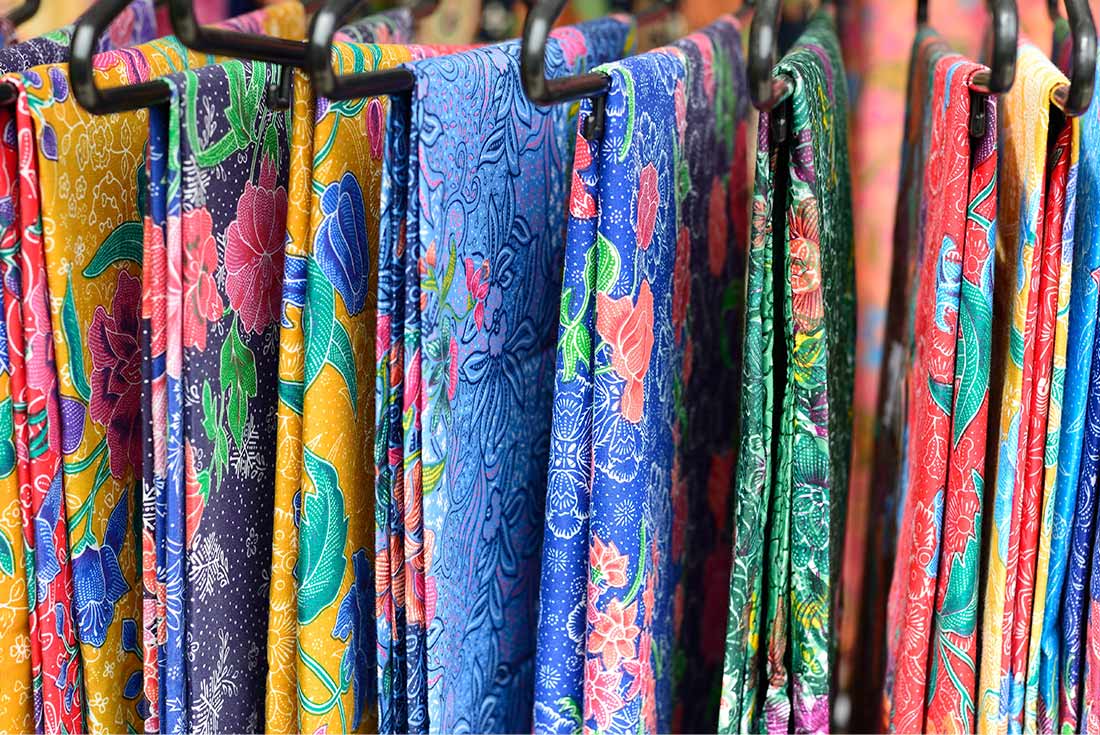
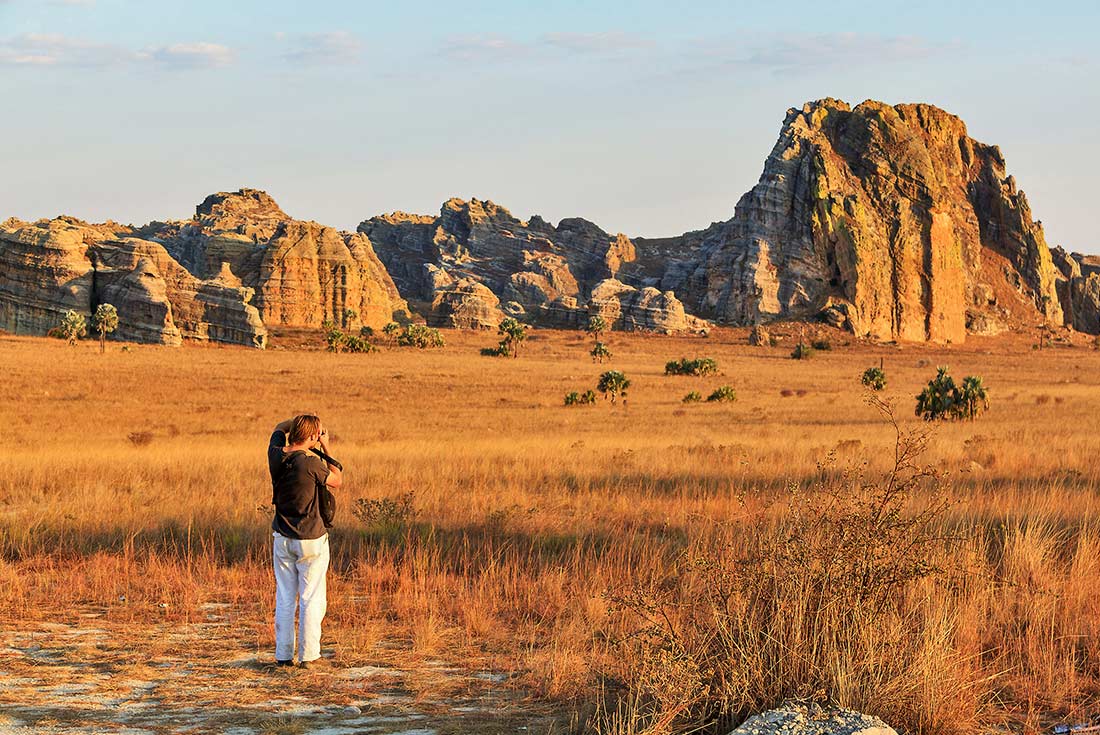
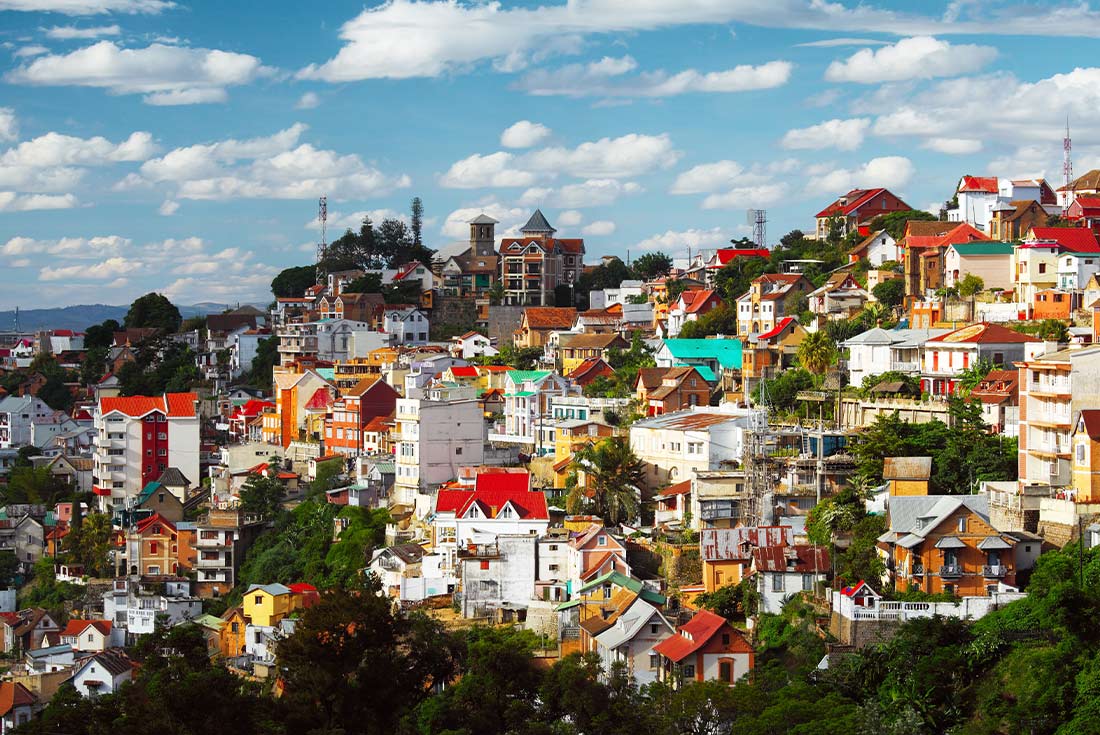
Miandrivazo - Tsiribihina River Trip
Miandrivazo - Tsiribihina River Trip
Bemaraha National Park - Small Tsingy walking circuit
Bemaraha National Park - Manombolo River Canoe Ride
Bemaraha National Park - Big Tsingy Trek
Morondava - Sunset at Baobab Alley
Tulear - Reniala Private Park
Tulear - Leader-led City Tour
Isalo National Park - guided walk
Ambalavao - Antemoro Paper Factory visit
Ambalavao - Anja Community Reserve
Fianarantsoa - Betsileo: village visit and walk
Ranomafana NP - Night Walk
Ranomafana National Park - Rainforest walk
Ranomafana - ValBio Research & Conservation Centre
Ambositra – Woodcarving workshop visit
Ranomafana - Conservation Lecture & Lunch
Ambositra - Village Visit
Ambositra - Sandrandahy Village Lunch
Andasibe National Park - Analamazaotra Special Reserve Night Walk
Antananarivo - Malagasy Chocolate Workshop
Witness a spectacular pink and yellow sunset behind towering, 800-year-old trees along the Avenue of the Baobabs in the laid-back seaside town of Morondava.
Travel along the Tsiribihina River in a traditional barge, stopping to hike to hidden waterfalls, explore remote villages and camp among nature on the banks.
Trek through a forest of limestone karsts and cross a sheer drop on a suspended bridge at the Great Tsingy, keeping an eye out for native wildlife including 11 species of lemur.
Support a noble cause while exploring Anja Community Reserve and the Mitsinjo Forest – these reserves are not just sanctuaries for wildlife but also beacons of community empowerment and conservation.
Take a hands-on chocolate-making class and learn the secrets that make Malagasy chocolate unique and delicious. Then, sample your creations with pastries, tea, coffee and rum!
Hotel Belvedere, Lot IF 27 bis Isoraka, Antananarivo, 101, MADAGASCAR, Phone: +261 347986638
Hotel Belvedere, Lot IF 27 bis Isoraka, Antananarivo, 101, MADAGASCAR, Phone: +261 347986638
1. A single supplement is available if you’d prefer not to share a room on this trip. The single supplement exclude Day 3 (River Camping), Day 12,13 (Lodge) and Day 14 (Guesthouse) where you will be in shared accommodation, and is subject to availability. Please speak to your booking agent for further information.
2. An internal flight is included on this trip. Baggage allowance is as follows:
- Checked: 1 Bag, max 20kg
- Carry-on: 1 bag, max 5kg.
4. Internal flights in Madagascar are often delayed and or cancelled at short notice and may be rescheduled to an evening, night, or even the following day departures.
5.A scanned copy of the personal details page of your passport needs to be sent to your booking agent no later than 50 days before departure for us to book the internal flights on this tour.
6. Days 21 and 22 in Anakao has bungalow style accommodation. In true Eco fashion there is no running water in the bungalows and there is no hot water in the camp. Each bungalow is regularly supplied with a bucket of fresh water for washing and flushing the toilet.
While we always endeavour to provide the best possible holiday experience, due to the nature of travel and the areas we visit sometimes things can and do go wrong. Should any issue occur while you are on your trip, it is imperative that you discuss this with your group leader or local representative straight away so that they can do their best to rectify the problem and save any potential negative impact on the rest of your trip.
We recognise that there may be times when your group leader or local representative may not be able to resolve a situation to your satisfaction - if this is the case, please ask the group leader or local representative to speak to their direct manager.
You may also choose to provide details in your online feedback, which we ask you to complete within 30 days of the end of your trip. Please do be aware that it is very difficult for us to provide any practical help after the trip is completed, so informing us while still travelling will give us the opportunity to resolve the issue in real-time., For general contact details please use the following page: https://www.intrepidtravel.com/contact-us, If you have booked an arrival or departure transfer and experience delays, or if you are unable to locate your driver, please contact the transfer operator directly using the number provided in the joining point or finishing point instructions sections., In case of a genuine crisis or emergency, you can reach our local office on the numbers below:
, +261 38 2066 009
A good level of fitness is required for this trip. With treks, camping, and long journeys, it is a challenging trip, so we recommend being in good physical condition to get the most out of your experience., There are two nights of river camping on this tour. There are no bathroom facilities, and it will not be possible to shower for three days, though water is available for washing., Road conditions in Madagascar are notoriously very poor and unmaintained. Due to government inaction and yearly monsoons, conditions can be terrible and a level of patience is required. Most of the driving days on this trip will be long and bumpy., Some accommodation inside the national parks is basic and may not have the creature comforts of hotels in bigger towns and cities. Be prepared for no wifi or air conditioning, but also for charming, tucked-away locations you won’t quite believe are real., The visible vertical drop at the Big Tsingy can be quite intimidating, especially for those with vertigo.
Witness a spectacular pink and yellow sunset behind towering, 800-year-old trees along the Avenue of the Baobabs in the laid-back seaside town of Morondava., Travel along the Tsiribihina River in a traditional barge, stopping to hike to hidden waterfalls, explore remote villages and camp among nature on the banks., Trek through a forest of limestone karsts and cross a sheer drop on a suspended bridge at the Great Tsingy, keeping an eye out for native wildlife including 11 species of lemur., Support a noble cause while exploring Anja Community Reserve and the Mitsinjo Forest – these reserves are not just sanctuaries for wildlife but also beacons of community empowerment and conservation., Take a hands-on chocolate-making class and learn the secrets that make Malagasy chocolate unique and delicious. Then, sample your creations with pastries, tea, coffee and rum!
All group trips are accompanied by one of our group leader or local representative. The aim of the group leader or local representative is to take the hassle out of your travels and to help you have the best trip possible. Intrepid endeavours to provide the services of an experienced group leader or local representative however, due to the seasonality of travel, rare situations may arise where your group leader or local representative is new to a particular region or training other group leader or local representative.
Your group leader or local representative will provide information on the places you are travelling through, offer suggestions for things to do and see, recommend great local eating venues and introduce you to our local friends. While not being guides in the traditional sense, you can expect them to have a broad general knowledge of the places visited on the trip, including historical, cultural, religious, and social aspects. At Intrepid we aim to support local guides who have specialised knowledge of the regions we visit. If you are interested in delving deeper into the local culture at a specific site or location then your group leader or local representative can recommend a local guide service in most of the main destinations of your trip.
, On this trip for small groups of 1-3 travellers your leader will also be your driver. For sustainability and a lower carbon footprint, we will also use a 4x4 SUV or similar, rather than a van or coach.
TRAVEL ADVISORIES & ALERTS
We recommend that you check your government's foreign travel advisory for the latest information about the destination before you travel. You will also need to ensure that your travel insurance covers you for all destinations and activities on your trip. We also recommend saving the phone number for emergency consular assistance for your government’s consulate in the destination/s you’ll be travelling. Links to travel advisories and any current travel alerts for our trips can be found here: https://www.intrepidtravel.com/travel-alerts
PERSONAL SAFETY
Ensure you have a secure method of carrying your passport, phone, credit cards and cash while travelling such as a money belt. Leave all other high value items, including jewellery, at home Use safety deposit boxes at hotels to store your valuables when available and ensure your luggage is lockable. Be aware of the risk of pick-pocketing and petty theft. Exercise caution when walking at night, don’t walk alone and stick to well-lit streets wherever possible. Be vigilant on public transport and look out for your fellow travellers. Take precautions such as carrying your bag in front of you and never leaving personal items unattended.
LGBTQIA+ TRAVELLERS
Intrepid welcomes all LGBTQIA+ customers on our trips, however we operate in parts of the world that are less accepting. We support LGBTQIA+ customers to travel to these destinations and are committed to ensuring they face no discrimination on any part of the trip we control. We recommend you visit Equaldex (https://www.equaldex.com/) and your government's foreign travel advice for LGBTQIA+ travellers when choosing your trip., FREE TIME & OPTIONAL ACTIVITIES
Your group leader or local representative will accompany you on all included activities; however, during your trip, you'll have some free time to pursue your own interests, relax and take it easy or explore at your leisure. While your group leader or local representative will assist you with the available options in a given location, please note that any optional activities you undertake are not part of your Intrepid itinerary, and Intrepid makes no representations about the safety of the activity or the standard of the operators running them. Please use your own good judgment when selecting an activity in your free time. Please also note that your group leader or local representative has the authority to amend or cancel any part of the trip itinerary if it's deemed necessary due to safety concerns.
INTREPID SAFETY STANDARDS
For more details on the type of conditions and safety standards you can expect on your trip, please refer to Intrepid's operational safety policy on our website. We recommend that you take a moment to read through this information before travelling, and would appreciate any feedback on how well it's being implemented in the field:
www.intrepidtravel.com/safety-guidelines
PASSPORT
You’ll need a valid passport to travel internationally and most countries require your passport to have a minimum of 6 months validity, so remember to check the expiry date.
We need your passport information to get everything ready for your trip so it’s important that the information on your booking matches your passport exactly. Please take care to provide the correct details. We recommend carrying a copy of the photo page of your passport while travelling and leaving a copy at home with family or friends.
VISAS & ENTRY REQUIREMENTS
Many countries require a visa and obtaining the correct visa for your trip and any countries you may transit through is your responsibility. We recommend you check your visa requirements as soon as you have booked your trip. This will ensure you have time to prepare your documents and for your visa application to be processed. You can check the entry requirements for your nationality on your government's foreign travel advisories, consular websites or on our page here: www.intrepidtravel.com/visa-entry-requirements
Information not available.
Validity: 01 Jan 2025 to 31 Dec 2025
GENERAL HEALTH
All travellers need to be in good physical health in order to participate fully on this trip. For the safety and wellbeing of yourself and others, if you are unwell prior to travelling, please stay at home and contact us to make alternative arrangements.
When selecting your trip please make sure you have read through the itinerary carefully and assess your ability to manage and enjoy our style of travel. Please note that if in the assessment of our group leader or local representative a traveller is unable to complete the itinerary without undue risk to themselves and/or the rest of the group, we reserve the right to exclude them from all or part of a trip without refund.
You should consult your doctor for up-to-date medical travel information or for any necessary vaccinations before departure. We recommend that you carry a first aid kit as well as any personal medical requirements in their original packaging as they may not easily be obtained while travelling. If you are carrying medication, ensure you check your government's foreign travel advice for any local restrictions or requirements.
, YELLOW FEVER:
A valid international certificate of vaccination against Yellow Fever is required in many countries if you are arriving from a country with risk of yellow fever (eg. Kenya). You may need to present this on arrival at the airport or border crossing. Some countries will refuse entry if you are unable to present your certificate. It's also quite common for your home country to request a Yellow Fever certificate on your arrival back home.
It is your responsibility to check with your doctor well in advance of leaving home about the Yellow Fever requirements for the countries you'll be visiting.
, MALARIA & DENGUE
Malaria and Dengue are mosquito-borne diseases commonly found in many parts of Africa. Before you travel, discuss your itinerary with a doctor and monitor your government foreign travel advice for up-to-date information on risk levels in particular areas. To reduce your risk of mosquito bites, protect yourself by using insect repellent and wearing long, loose, light-coloured clothing.
Malaria symptoms typically appear 7–30 days after infection and may include fever, chills, headache, and fatigue. Doctors can prescribe medication to help prevent Malaria, so it’s important to consult your healthcare provider before travelling.
Dengue symptoms generally emerge 4–10 days after being bitten. These may include high fever, severe headache, joint and muscle pain, nausea, and rash. As there is no specific medication for Dengue prevention, avoiding mosquito bites is key.
If you develop symptoms of Malaria or Dengue while travelling or after returning home, seek medical attention straight away.
, DRINKING WATER
As a rule, we recommend you don't drink tap water, even in hotels, as it may contain much higher levels of different minerals than the water you are used to at home. For local people, this is not a problem as their bodies are used to this and can cope, but for visitors drinking the tap water can result in illness. Generally, this isn't serious, an upset stomach being the only symptom, but it's enough to spoil a day or two of your holiday. Many hotels and lodges provide safe drinking water, while bottled water is another alternative. Water consumption should be about two litres a day. Rehydration salts, motion sickness tablets, and diarrhea blockers are available from many pharmacies - please source from home and bring them with you on your travels.
While travelling with us you'll experience the vast array of wonderful food available in the world. Your group leader or local representative will be able to suggest restaurants to try during your trip. To give you the maximum flexibility in deciding where, what and with whom to eat, generally not all meals are included in the trip price. This also gives you more budgeting flexibility. As a rule, our groups tend to eat together to enable you to taste a larger variety of dishes and enjoy each other's company. If you have dietary requirements and/or food allergies, please let your booking agent know prior to departure., Your group leader will endeavour to cater for specific dietary requirements where possible, and vegetarianism and gluten intolerance will be catered for in most instances. Please notify your group leader of any dietary requirements in your group meeting at the start of the trip.
For those suffering from particular food allergies, your group leader will endeavour to disclose to their fullest knowledge the main ingredients in dishes being consumed. It is, however, your personal responsibility to ensure that you do not ingest any foods to which you are allergic.
Alcoholic or non-alcoholic beverages are not part of included meals.
, TYPICAL MEALS DURING TREKS
Breakfast: Coffee/tea, bread with jam or honey, seasonal fruits, and cereals.
Lunch: Pasta or rice salad with chicken, or a sandwich with seasonal fruit.
Dinner: Vegetable soup, rice or pasta with meat in sauce, and pancakes for dessert.
Packed Lunches: Meat or veggie sandwich with seasonal fruit.
Note: Vegetarian options are available upon request at booking.
SPENDING MONEY
When it comes to spending money on the trip, every traveller is a little different. You know your spending habits better than we do, so please budget an appropriate amount for things like optional meals, drinks, shopping, optional activities, and laundry. Make sure you have read the itinerary and inclusions thoroughly so you know what is included in the trip price and what you may need to pay for while travelling. , MADAGASCAR
The local currency in Madagascar is the ariary (MGA). You will need to bring USD or EUR cash in large denominations to exchange. We recommend exchanging into local cash at the airport or in Antananarivo to get the best exchange rate. Foreign currencies are not accepted as payment in Madagascar.
We advise against relying on withdrawing cash from ATMs or banks, or paying by card. As a backup option, Visa and Mastercard are the most likely to work in Madagascar., MEALS NOT INCLUDED
We recommend USD 30 – 50 per day for meals not included., TIPPING
Tipping can be an appropriate way to recognise great service when travelling. While it may not be customary in your home country, it is an entrenched feature of the tourism industry across many of our destinations and is greatly appreciated by the people who take care of you during your travels. It is always best to avoid tipping with coins, very small denomination notes, or dirty and ripped notes, as this can be regarded as an insult rather than the goodwill gesture it is intended to be., OPTIONAL TIPPING KITTY
On Day 1 of your trip, your group leader or local representative may discuss with you the idea of operating a group tipping kitty, whereby everybody contributes an equal amount and your group leader or local representative distributes tips for drivers, local guides, hotel staff and other services included on your trip. Participation in this kitty is your choice, and you are welcome to manage your own tipping separately if you prefer.
The group leader or local representative will keep a running record of all monies spent, which can be checked at any time. Any funds remaining at the end of the trip will be returned to group members. These tips to suppliers are for great service and are in addition to the regular costs paid for the services supplied.
The tipping kitty excludes tips for your group leader or local representative, and providers of optional activities., Optional tipping kitty from Antananarivo to Antananarivo: USD 52 per person.
Optional tipping kitty from Antananarivo to Antananarivo: USD 52 per person., YOUR GROUP LEADER OR LOCAL REPRESENTATIVE
Tipping your group leader or local representative is highly appreciated if you feel they’ve provided outstanding services throughout your trip. The amount is entirely a personal preference; however, as a guideline, the recommended amount is 4-7 USD or EUR per traveller per day (in a currency relevant to your destination). Of course, you are free to tip more or less as you see fit, depending on your perception of service quality and the length and involvement of your group leader or local representative on your trip., ADDITIONAL CREW
You may have additional crew on your trip, such as a local guide, driver or cook. We recommend tipping each person USD 2 – 4 per person per day (in a currency relevant to your destination)., CONTINGENCY FUNDS
We try to plan for every eventuality, but there are still some things beyond our control. We reserve the right to change an itinerary after departure due to local circumstances or a Force Majeure Event. In such emergency circumstances, the additional cost of any necessary itinerary alterations will be covered by you. Please note we are not responsible for any incidental expenses that may be incurred as a result of the change of itineraries including but not limited to visas, vaccinations or non-refundable flights. Make sure you have access to an extra US$500 for emergencies (e.g. severe weather, natural disasters, civil unrest) or other events that result in unavoidable changes to the itinerary (e.g. transport strikes or cancellations, airport closures). Sometimes these things necessitate last-minute changes to enable our trips to continue to run, and as a result, there may be some extra costs involved. The recommended amount is listed in USD for the relatability of universal travellers, however, local currency may be needed once in the country to cover these costs., COMMISSIONS
Intrepid understands that the receipt of commissions in exchange for recommending particular shops or services is ingrained in the culture of the tourism industry. For this reason, we have established a centralised fund for contributions from recommended suppliers so these can be collected and distributed back into the business. Actively managing the receipt of commissions helps us maintain the level of quality you expect on one of our trips. Travel is always an adventure so Intrepid cannot explicitly guarantee the quality of a product but we aim to provide the best value trips in the market. Please let us know via the feedback form completed after your trip if we are successfully meeting - or exceeding - this objective.
Most travellers prefer to take a small to medium wheeled suitcase, which is a great size for the packing capacity in our private vehicles. Whatever you take, be mindful that you will need to be able to carry your own luggage, handle it at airports, take it in/out of accommodation and perhaps even walk short distances. We recommend you pack as lightly as possible.
If your trip includes travelling on overnight trains or primarily using public transport, the smaller your luggage, the easier it will be to store under or above bunks. Large suitcases may not be able to be taken on board. A lockable bag or small padlock for your bag will be useful, especially when travelling on public transportation as well.
When you're exploring during the day, you'll also need a day pack/bag to carry water, a camera, a jacket and activity-specific items like a swimsuit, a waterproof pouch/bag for your phone, or hiking shoes.
Below we have listed the essentials for this trip:, https://www.intrepidtravel.com/packing-list, WATER BOTTLE
Please bring your own water bottle to refill. Although it can be difficult to avoid bottled water when travelling, please use the water dispensers which are provided on some of our vehicles and at some of our accommodation. When unable to avoid bottled water, it is better to buy the largest available and distribute it into your smaller bottle for the day. Some travellers like to bring a bottle with its own filtration system or water purification tablets. If you are walking or trekking as part of your trip, you will need to carry at least 2 litres of water with you., What you need to bring will vary according to the trip style you have chosen, the countries you are visiting and when you are travelling. Generally speaking, we recommend you pack as lightly as possible and make sure that you are able to carry and lift your own luggage, and walk with it for short distances.
Most travellers carry their luggage in a backpack, although an overnight bag with a shoulder strap would suffice if you travel lightly. Smaller bags or backpacks with wheels are convenient although we recommend your bag has carry straps. You'll also need a day pack/bag to carry water and a camera etc for day trips.
Below are some ideas and helpful tips on what you specifically need for this trip.
ESSENTIALS:
- Closed in shoes. As most of our trips include some bush walking we highly recommend that you take a pair of comfortable, closed-in walking shoes. Closed-in shoes will help to protect your feet from cuts and scratches when walking through bush/grass-lands, and will also act as a barrier protection in rare cases against bites or stings from dangerous animals in this environment.
- Lightweight clothing. You will need to bring a mixture of lightweight clothing, some warm items for the evenings, and long shirts and pants for protection against the sun and mosquitoes in the malaria areas. Clothes should be easy to wash and dry. Avoid materials that are heavy, tough to dry, non-breathable, and retain heat or moisture, such as nylon, polyester, and denim. Instead, opt for lightweight, breathable fabrics like cotton, linen, and moisture-wicking synthetics designed for hot weather. Ex-military or military-style clothing and equipment are NOT recommended.
- Sun protection - hat, sunscreen, sunglasses
RECOMMENDED:
- A good quality, high-beam headlamp or torch for around the lodges and permanent tented sites at night. Some of these properties have limited lighting and are powered by generators that switch off at a certain time.
- Waterproof/windproof jacket is a good idea for wet days, and early morning or evening activities when it can be cool.
- Warm fleece and beanie for morning and evening activities including game drives where applicable.
- Personal medical kit. Large kits will be on hand at the lodges and from your group leader or local representative (on trips that have a dedicated group leader or local representative ) but we recommend you carry items such as mild pain killers, electrolytes and bandaids.
- Insect repellent.
- Water bottle. The sale of bottled water contributes to an enormous environmental problem around the world. In addition to the water in bottles, the production of a 1 litre plastic bottle takes 2 litres of water and 200ml of oil. A large proportion end up in limited landfill or discarded in waterways and natural environments.
- Camera with spare battery or power bank.
- Binoculars
OPTIONAL:
- Ear plugs to guard against a snoring room-mate.
- A good book, journal, music, podcasts, etc. for the long drives.
LUGGAGE LIMIT:
Please keep your luggage to a minimum. One small soft-sided bag plus a day pack (no more than 15-20kgs in total per person) is essential.We recommend against bringing hard/externally framed suitcases as they are difficult to store and can damage equipment and other travellers' belongings. If your trip is beginning and ending at the same location, excess luggage can usually be stored at your arrival/departure hotel and can be collected after your trip.
VALUABLES:
Please try to avoid bringing unnecessary valuables, and use your hotel safe. It’s also a good idea to purchase a money belt or pouch that is easily hidden. We strongly recommend that you photocopy all important documents e.g. air tickets, passport, vaccination certificate, etc. and keep the copies separate from the originals. While not valid, a photocopy makes it very much easier to obtain replacements if necessary.
BATTERIES/POWER:
Our trips have access to power to recharge batteries for phones and cameras every couple of days. We always recommend that you carry an extra battery or powerbank just in case.
CONSERVATIVE DRESS FOR WOMEN:
In many parts of Africa women travelers should dress modestly as there is a wide range of cultural differences. Wear skirts or shorts that reach just above the knee and tops that cover shoulders at a minimum. If visiting coastal areas wear a cover-up when you step off the beaches.
Madagascar has a diverse climate, with coastal regions being tropical and inland areas experiencing a more temperate climate. Coastal areas generally have warm, humid summers (November to April) with temperatures ranging from 25°C to 35°C (77°F to 95°F), accompanied by higher rainfall. Winters (May to October) are cooler, with temperatures between 18°C and 28°C (64°F to 82°F) and less rain.
The inland highlands, including the capital Antananarivo, experience cooler temperatures year-round, with summer highs ranging from 20°C to 28°C (68°F to 82°F) and cooler evenings. Winters in the highlands can be chilly, with temperatures dropping to 10°C (50°F) at night.
We recommend checking the weather forecast before departure, as conditions can be unpredictable.
Intrepid won't tolerate any kind of violence, harassment (whether physical, verbal or sexual), or disrespect toward fellow travellers, our teams or local communities.
To ensure the wellbeing of everyone on the trip, decisions made by your group leader are final.
Romantic relationships between travellers and group leader or local representative are not permitted while on trip.
Any behaviour that prevents your leader from continuing the itinerary as planned, breaks local laws or opposes any of these guidelines may result in Intrepid denying your booking or removing you from the trip.
If something concerns you during your travels, please speak to your group leader immediately. Alternatively, you can contact us on the emergency contact number detailed in the Problems and Emergency Contact Information section of this Essential Trip Information.
The style of accommodation indicated in the day-to-day itinerary is a guideline only and may change. On some occasions, alternative arrangements may need to be made due to the lack of availability of rooms in our preferred accommodation. In these cases, we will use a similar standard of accommodation.
Throughout the trip, we request that our properties prepare rooms in time for our arrival, especially if we're arriving prior to normal check-in time. However, this isn't always possible which means we won't be able to check-in immediately on arrival at some hotels. Instead, we can store our luggage and explore our new destination or on some trips, have use of shared day rooms until all rooms are available.
Information not available.
Travel insurance is compulsory on all our trips for those travelling internationally. We require that, at a minimum, you are covered for medical expenses, including emergency repatriation. If you are travelling within your home country or region, please confirm before travel that you are entitled to access the public medical system easily should an accident occur. We strongly recommend all travellers have a policy that also covers personal liability, cancellation, curtailment and loss of luggage or personal effects. For international trips, you will not be permitted to join the group until evidence of travel insurance and the insurance company's 24-hour emergency contact number has been sighted by your group leader or local representative.
If you have credit card insurance, your group leader or local representative will require details of the participating insurer/underwriter, the level of coverage, policy number, and emergency contact number, rather than the bank's name and your credit card details. Please contact your bank for these details prior to arriving in-country.
For travellers who reside within the European Union, Switzerland or the USA, the requirement to purchase travel insurance cannot be compulsory. However, the purchase of travel insurance is still highly recommended, and each country you visit may have its own specific entry requirements. For example, some mandate travel health insurance for all foreign travellers, regardless of their nationality. Travellers from the European Union, Switzerland or the USA who decline travel insurance when travelling outside their home region must sign a Travel Insurance Waiver Form at the Group Meeting, recognizing personal responsibility for emergency medical and repatriation costs should they arise.
For assistance with travel insurance or other services, please visit the link below:
, https://www.intrepidtravel.com/booking-resources/our-services
As you travel on a group trip you will be exposed to all the pleasures and maybe some of the frustrations of travelling in a group. Your fellow travellers will probably come from all corners of the world and likely a range of age groups too. We ask you to be understanding of the various needs and preferences of your group - patience with your fellow travellers is sometimes required for the benefit of everyone's travel experience. Remember too that you have responsibilities to the group. If you are requested to be at a place at a certain time, ensure that you don't keep the rest of the group waiting. We have found time and time again that the very best trips we operate are those where the dynamics within the group work well - this takes just a little effort on your part. Due to privacy reasons, we are unable to provide you with contact details and any personal information about your fellow travellers booked on your trip prior to departure., SOLO TRAVELLERS
On our trips, rooming is organised on a twin-share basis. We pair up solo travellers with another traveller of the same gender, as per the gender marker on each of their passports.
We also offer an optional single supplement on most trips for travellers who prefer to have their own room. This only applies to accommodation during the tour. Pre-trip and post-trip accommodation booked through us will always be on a single-room basis.
On a small selection of trips some accommodation will be open-gender and multishare, such as a felucca in Egypt or an overnight train in Vietnam. Please review the Accommodation section of the Essential Trip Information for details about your trip.
LGBTQIA+ TRAVELLERS
We strive to create a safe and inclusive environment for everyone. If your gender identity differs from what is indicated on your passport, please contact us so that we can discuss rooming options with you.
ITINERARY CHANGES
Our itineraries are updated regularly throughout the year based on customer feedback and to reflect the current situation in each destination. The information included in this Essential Trip Information may therefore differ from when you first booked your trip. It's important that you review this information prior to travel so that you have the latest updates. Due to weather, local conditions, transport schedules, public holidays, political unrest or other factors, further changes may be necessary to your itinerary once in-country. Your group leader or local representative will keep you up to date with any such changes once your trip is underway and has the authority to amend or cancel any part of the trip itinerary if deemed necessary due to safety concerns.
, ROAD CONDITIONS AND INFRASTRUCTURE IN AFRICA:
Roads in Africa are often in very poor condition, which makes it hard on our vehicles. Our vehicles are serviced regularly and are generally in good condition, but breakdowns can and do happen. Sometimes the going on this trip is quite tough, the distances covered fairly large and some of the roads and tracks are not exactly smooth or free from dust, but the rewards are exceptional. The travelling times indicated in our Essential Trip Information is just a rough guide and is dependent on various factors that may be outside our control, such as road conditions, weather and time spent at borders.
DRIVE TIMES:
The travel times listed in the day to day itinerary are a guide only. Please be aware that delays may occur and please be patient - it's all part of the experience afterall! Additionally, the travel times do not include time spent on game drives as these can vary with each departure., OPTIONAL ACTIVITIES
A selection of optional activities that have been popular with past travellers are listed in the day-to-day itinerary. This isn't an exhaustive list and should be used as a guide only for some of what might be available. Prices are approximate, are for entrance fees only, and don’t include transport to and from the sites or local guides unless indicated. All activities are subject to availability, and maybe on a join-in basis. It may not be possible to do all the activities listed in the time available at each destination, so some pre-planning for what you are most interested in is advised. When it's recommended that travellers pre-book these activities, look for a note in the Special Information section of the day-to-day itinerary. For most, they can either be organised independently on the day, or let your group leader or local representative know you are interested at the Welcome Meeting and they can assist.
Where activities are considered medium or high risk, we work with operators whose safety and credentials we have sighted and assessed. Although it is possible that you may find the same activity cheaper with another operator on the ground, we cannot vouch for the safety or quality of that operator. Medium and high-risk activities not listed above have not been assessed by us and as such our staff and group leader or local representative are unable to assist you with organising these activities. Activities that contravene our Responsible Travel policies are also not listed. Please remember that the decision to partake in any activity not listed is at your own discretion and risk.